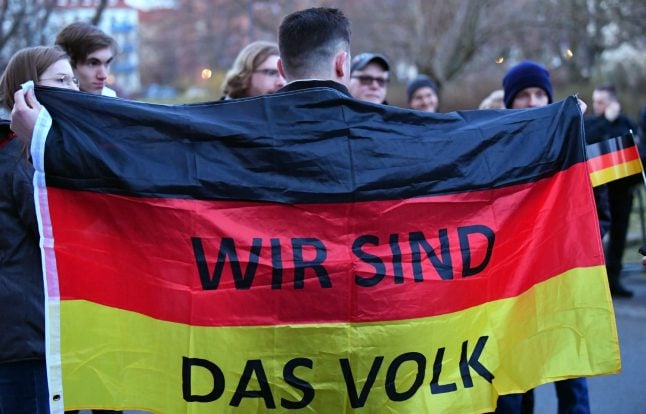It is the second attempt in a month to form a working government in the former East German state, after CDU MPs there unleashed an earthquake in national politics by voting with the far-right AfD in February.
Amid the national outrage, the liberal candidate elected during the first vote on February 5 stepped down, leaving the state rudderless.
But more significantly, the apparent cooperation of CDU politicians with the far-right triggered the departure of Merkel's designated successor Annegret Kramp-Karrenbauer, and sparked a new leadership contest for the German chancellor's party.
The race to a new CDU leadership election on April 25th is a fresh struggle for control between supporters of the chancellor's centrist course and those who believe the party must tack right.
But so far none has offered a convincing answer to the CDU's conundrum in Thuringia, squeezed between the extremes of left and right.
Popular local politician and former state premier Bodo Ramelow of the far-left Die Linke is now up against far-right firebrand Björn Höcke, with Merkel's conservatives once again the reluctant kingmakers.
READ ALSO:
- Merkel fires minister over far-right Thuringia fiasco
- Why Merkel and Germany are up in arms after shock far-right AfD vote
- 'First time in history': Far-right AfD backing for regional politician shocks Germany
New force on the right
A fundamental article of faith for the CDU during its decades of dominance of German politics since 1949 was that no political force could be allowed to emerge to its right.
It long provided a home for hardliners on issues like immigration, integration and refugees.
 The Left's Bodo Ramelow last month. Photo: DPA
The Left's Bodo Ramelow last month. Photo: DPA
But Merkel has shifted the party to closer to the centre.
The repeated rescue programmes for Greece during the eurozone crisis and above all, Merkel's decision to allow in more than one million migrants and refugees since 2015 stoked the rise of the AfD.
The far-right is especially strong in Germany's former communist east, which did not go through the same process of facing up to its Nazi past as the democratic west.

Graph prepared for The Local by Statista.
Double-digit scores for AfD in state elections in recent years have made it increasingly tough to build working coalitions that shut out both far right and the radical-left Left party.
With the party leadership – and likely the candidacy for the chancellorship in 2021 – now up for grabs, those tensions are boiling to the surface.
Some contenders such as long-time Merkel rival Friedrich Merz are advocating a return to the party's conservative roots and winning back voters lost to AfD.
- 'Trouble and turmoil': What the CDU crisis means for the future of Merkel and Germany
- From 'avenger' to 'anti-Merkel': Who could be Germany's next chancellor?
- 'Cripple democracy': How the far-right is out to shatter German politics
Meanwhile moderates argue the party cannot hope to hang on to masses of centrist supporters if it abandons Merkel's course.
Impossible choice
With no majority possible in Thuringia without either AfD or the Left, the state has become a unique crucible for the CDU's repeated declarations that it would work with neither.
Earlier this month, its MPs voted with AfD to install Thomas Kemmerich from the liberal FDP as state premier, ousting popular Left premier Ramelow.
Faced with national outrage at the unprecedented alliance, the Thuringian CDU branch immediately backed down and its leader quit, but it remains confronted with an impossible choice.
 The AfD's Björn Höcke congratulating the FDP's Thomas Kemmerich after the first vote that sparked outrage. Photo: DPA
The AfD's Björn Höcke congratulating the FDP's Thomas Kemmerich after the first vote that sparked outrage. Photo: DPA
“CDU votes for a Left party candidate are unacceptable,” moderate party leadership contender Armin Laschet said Sunday, echoing conservative rivals like Merz.
Tilman Kuban, leader of the party's national youth wing, even suggested Monday that MPs “leave the chamber” during the state premier vote to avoid the impression they had cooperated with AfD or the Left.
If Ramelow — whose previous broad left coalition is four votes short of a majority — fails to secure a mandate as state premier, the result will likely be more months with no regional government in Thuringia until fresh elections.
Meanwhile there is little chance of AfD contender Höcke winning.
One of the most radical voices within AfD, the former history teacher's rhetoric includes calls for “tempered inhumanity” in removing non-ethnic Germans from the country.
Such declarations have placed him beyond the pale even for the more hardline eastern CDU branches.
By Kit Holden



 Please whitelist us to continue reading.
Please whitelist us to continue reading.
Member comments